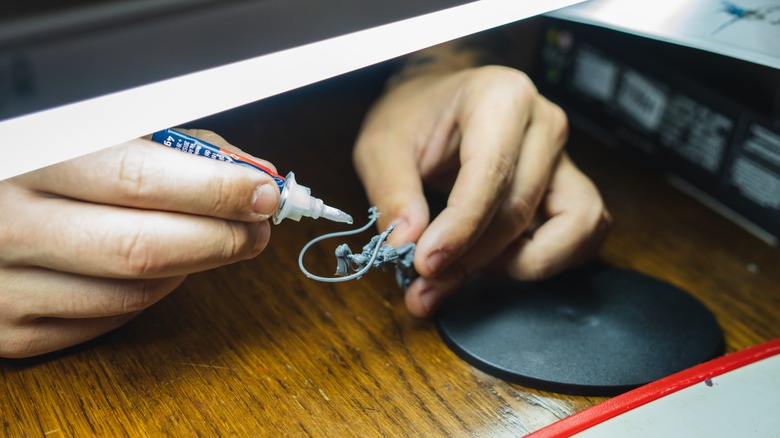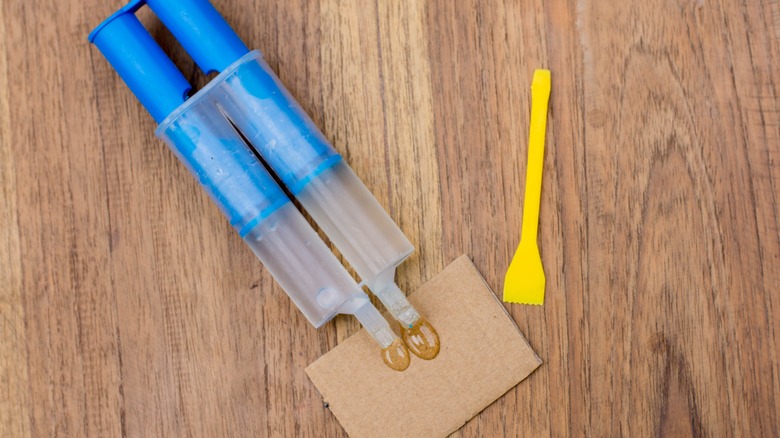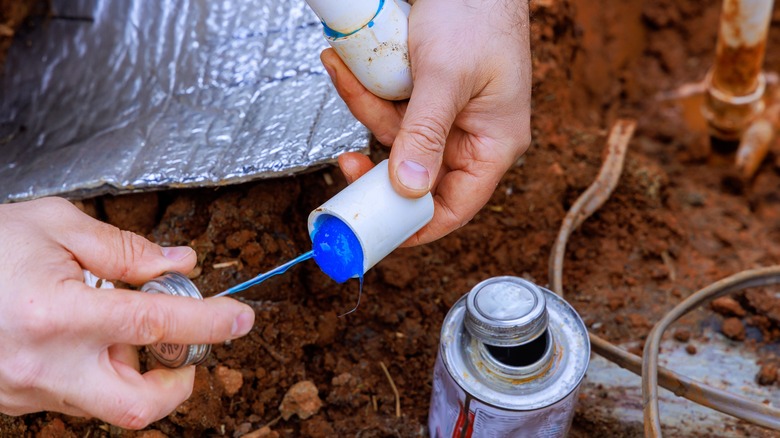The Strong Type Of Glue That Packs A Punch When Bonding Plastic
We may receive a commission on purchases made from links.
Plastics are ubiquitous in our homes. They're found in our appliances, fixtures, fittings, furniture, and various equipment. But like any other material, these household plastics may be vulnerable to breaking. At the same time, you may find yourself involved in a DIY project that requires plastic components to be glued together. Regardless of the reason you need to join two bits of plastic into one, it's important that the bond is strong and durable. That means you need to use the correct glue — wood and super glues tend not to work on plastic surfaces. In many cases, epoxy glue is your best bet.
Epoxy glue is effective at creating the strongest bonds between most types of plastics, whether it's the ABS plastic in your wall socket, the polycarbonate in the car headlamp, or the polystyrene in your home electronics. Epoxy glue even works for other materials too — it's the best glue for bonding metal to wood. This glue works so well because of its epoxide reaction process, as well as its ability to withstand high temperatures and imperviousness to water. Here's how to use epoxy glue correctly, along with other types of adhesives you can use on plastic.
How to use epoxy glue when bonding plastic
Epoxy glue comes as two separate components — the resin and the hardener. You need to mix the two components to produce the adhesive, but in the process, the ensuing chemical reaction releases lots of heat. That's why you must have a suitable container for mixing two-part epoxy glue. Thin plastic might melt due to the reaction, so it's safer to use a specially designed mixing container, like this one from mixing bucket Home Depot. Given the nature of the epoxy resin-hardener reaction, you should also protect yourself by wearing goggles and gloves. Covering your workspace is also a good idea so you don't smear it with the newly made adhesive.
Once you've got the right gear on and your mixing container is ready, combine the two parts of the adhesive in the mixer. Some epoxy glue will include two syringe applicators with their product to facilitate the process. If you don't have these syringes, just follow the manufacturer's instructions to get the right amounts of the two substances into the mixer. Next, stir the adhesive for up to a minute, or however long the manufacturer recommends (some products include a plastic spatula for this task). Now, apply the glue to one of the surfaces — make sure the surface is wiped clean of dust and debris — and press them together, using clamps if the object is large. The bond should cure in less than 20 minutes.
When to consider other types of plastic glue
In some situations, you may want to forgo epoxy glue and consider another adhesive type. For example, if you're joining unthreaded PVC pipes, you should use a specialty primer and PVC cement, like this one from Lowe's. The primer cleans and softens the PVC, while the cement breaks down the PVC in the two pieces and essentially bonds them into a single item. This type of bond is permanent, so you can't use PVC cement on threaded connections — for example, if you're trying to quickly repair a leaking pipe. Instead, threaded connections are easy to make using teflon thread tape, like this tape that's available at Amazon.
Likewise, polypropylene and polyethylene plastics may not bond well with epoxy. At home, you'll find polypropylene in food appliances and certain car parts, like bumpers and interior elements, while polyethylene is commonly used to make food containers and water storage vessels, like bottles and tanks. Glues are unable to penetrate the surface of these plastics — they just collect in beads on top of it. On the other hand, methyl methacrylate adhesives (MMA) generally have the strength to join polypropylene and polyethylene plastics. Hot melt adhesives are also strong enough to create a bond between these plastics, so a glue gun may prove handy. If you use hot melt adhesives often, here's how to keep your glue gun clean and ready at all times.


